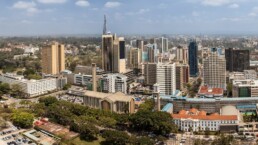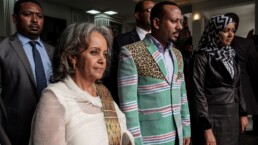Africa bears the largest losses from unreliable infrastructure in comparison to all other regions in the world, as indicated by the World Bank. The African continent is in desperate need for reliable and sustainable energy access, such as access to electricity which plays a crucial role for the ongoing business operations of local companies, especially in the manufacturing and health care sectors.
Even supposedly connected communities encounter regular power outages, where households and companies are equally affected. Companies’ productivity relies heavily on the supply of not only the mere access to basic infrastructure, but rather the steady and predictable access to it, since the interruption of important production processes can lead to serious economic consequences.
According to the African Development Banks’ Economic Outlook on the continent (2019), the unreliable access to electricity is the second biggest of 15 identified obstacles for doing business as well as the biggest obstacle for manufacturing enterprises. In Nigeria, Africa’s largest economy, the economic losses resulting from power cuts amount to more than 15 percent of the total turnover of manufacturing businesses. It is estimated that this number is a lot higher for businesses operating in the informal sector. The unreliable electricity supply can also be measured by the immense expenditure on diesel generators in Nigeria of about $12 billion each year, according to a Dalberg study. The estimates for the number of small gasoline generators in Nigeria thereby ranges from 17-60 million.
| Economy | Firms experiencing electrical outages (%) | Number of electrical outages
/month |
Losses due to electrical outages (% of annual
sales) |
Firms with generators (%) | Average proportion of electricity from a generator (%) |
| Sub-Saharan Africa | 76.2 | 8.3 | 7.8 | 51 | 26.9 |
| Benin | 95.6 | 28 | 9.4 | 59.9 | 37 |
| DRC | 89.3 | 12.3 | 7.8 | 59.5 | 37.2 |
| Côte d’Ivoire | 78.8 | 3.5 | 4.9 | 29.9 | 27.3 |
| Kenya | 82.8 | 3.8 | 5.4 | 65.6 | 17.8 |
| Namibia | 26.9 | 0.6 | 4.8 | 18 | 25.5 |
| Nigeria | 77.6 | 32.8 | 15.6 | 70.7 | 58.8 |
| Senegal | 83.7 | 6 | 2.8 | 64.2 | 9 |
| South Africa | 44.9 | 0.9 | 1.6 | 18.4 | 10.9 |
Source: World Bank data from years 2014-2018: This data is based on manufacturing firms only
While the consequences on the businesses may depend on factors such as the size of the company, the industry and the length of the outage, the impact on productivity and hence the economic output is enormous. The IMF estimates that the costs of interrupted production caused by electricity outage in Nigeria amount up to $29 billion annually.
Apart from the general macroeconomic consequences, employee productivity decreases as a direct result of power outages. In turn, this means that tasks will not be executed as efficiently, thus leading to less competitive companies on the global market. For producing enterprises outages might even result in an entire stop of the production value chain. Particularly companies in the manufacturing sector as well as in the healthcare industry, depend heavily on reliable energy access in order to keep ongoing business operations running.
Taking a plastic processing company as an example, the sudden stop of machinery will not only slow down the process but let material cool down, making it impossible to further process. Consequently, the entire production up to this point would be futile and a complex cleaning process would have to be initiated to get the business operations up and running again.
Power outages can also carry devastating consequences, if cooling supply chains are interrupted, especially regarding life-saving medication.
The costs that arise due to the interruption of production and the repairing of damaged equipment alone have a direct economic impact on the affected businesses. Additional costs to run a diesel-run generator, which is widely used to back up electricity shortages, are tremendous with severe environmental damages.
The access to energy, in general, remains a key issue for the development as rightly captured in the Sustainable Development Goal (SDG) 7 that aims to “ensure access to affordable, reliable, sustainable and modern energy for all”. African states have largely identified general electrification as a key priority in their respective development agendas, which is reflected in a study by the Infrastructure Consortium for Africa. The study shows that of approximately US100 billion dollars overall funding across sectors, about 43% are being allocated to energy. However, the reliability on energy access will have to be addressed simultaneously to meet the targets of the SDG 7 and for companies to have a chance to be competitive on the global market.
Given Africa’s rapid population growth, 9 out of 10 people on the continent will be living without electricity by 2030, if policymakers do not implement adequate policies to tackle the issues of electricity outages as a matter of urgency. In order to ensure reliable access to electricity and hence improving African companies’ productivity, it is the responsibility of African governments to transform existing infrastructure and also create an investor-friendly environment for alternative energy sources.
Currently, less than 15 African countries can present an official electrification plan, an essential requirement in attracting investment to address financing gaps that are a key issue for the sector. Within the framework of an official electrification plan, the usually state-owned and inefficiently working power utilities in most African countries require reforms. Additionally, access to finance for energy projects shall be improved through the creation of an adequate policy framework.
While developing official electrification plans, African governments should also take alternative sources of energy into consideration. Energy derived from coal appears to be the least cost-intensive option. However, in order to fulfill the SDG 7 and secure sustainable and reliable energy, renewable energy sources such as solar energy must be taken into consideration.
If governments manage to reduce upfront payments for solar systems and create an investment-friendly policy framework, alternative energy concepts, including “pay as you go” (PAYG) concept, as implemented by M-KOPA in Kenya, will have a chance to be adapted in other countries.
In the meantime, the most important and obvious strategy for governments will be to reform existing power utilities by adequate maintenance work and equipment repair, as well as the outline of a targeted distribution network, minimizing the affected number of customers in case of an outage.
The views expressed in this article are those of the author alone and not the Future Africa Forum.
The views expressed in this article are those of the author and do not necessarily reflect the views of Future Africa Forum. Future Africa Forum is a pan-African policy think-tank and policy advisory consultancy headquartered in Nairobi, Kenya.



